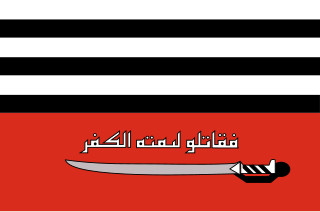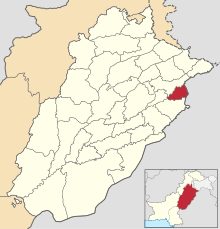Sectarian violence in Pakistan refers to violence directed against people and places in Pakistan motivated by antagonism toward the target's religious sect. As many as 4,000 Shia are estimated to have been killed in sectarian attacks in Pakistan between 1987 and 2007, and thousands more Shia have been killed by Salafi extremists from 2008 to 2014, according to Human Rights Watch (HRW). Sunni Sufis and Barelvis have also suffered from some sectarian violence, with attacks on religious shrines killing hundreds of worshippers, and some Deobandi leaders assassinated. Pakistan minority religious groups, including Hindus, Ahmadis, and Christians, have "faced unprecedented insecurity and persecution" in at least two recent years, according to Human Rights Watch. One significant aspect of the attacks in Pakistan is that militants often target their victims places of worship during prayers or religious services in order to maximize fatalities and to "emphasize the religious dimensions of their attack".

The Lashkar-e-Jhangvi, is a Deobandi supremacist, terrorist and militant organisation based in Afghanistan. The organisation operates in Pakistan and Afghanistan and is an offshoot of anti-Shia party Sipah-e-Sahaba Pakistan (SSP). The LeJ was founded by former SSP activists Riaz Basra, Malik Ishaq, Akram Lahori, and Ghulam Rasool Shah.

The 2009 Karachi bombing or Ashura attack took place on 28 December 2009 inside a Shia procession commemorating the day of Ashura, at Muhammad Ali Jinnah Road, Karachi, Pakistan. Ashura is the holiest of days for followers of Shia Islam and marks the anniversary of the death of Hussain, grandson of the Islamic prophet Muhammad, who was killed at the battle of Karbala in 680. At least 30 people were initially reported to have been killed, later figures revealed even more deaths while dozens were left injured in the wake of the attack. The attacker marched amongst the procession with tens of thousands of people attending the march. There is some speculation amongst officials as to whether the nature of the blast was that of a suicide attack or a remotely detonated or planted bomb.

The March 2010 Lahore bombings were three separate, but related, bomb attacks in the Pakistani city of Lahore on 8 and 12 March 2010. Lahore, with a population of six million, is Pakistan's second largest city, and the capital of the Punjab province. After several attacks in Lahore in 2009, these were the first major incidents in the city in 2010. The 12 March bombings are the deadliest attacks in Pakistan to date in 2010.

The July 2010 Lahore bombings occurred on 1 July 2010 in Lahore, Punjab, Pakistan. Two suicide bombers blew themselves up at the Sufi shrine, Data Darbar Complex. At least 50 people were killed and 200 others were hurt in the blasts. It was the biggest attack on a Sufi shrine in Pakistan since 2001.
The September 2010 Quetta bombing occurred on 3 September 2010 in Quetta, Pakistan. At least 73 people were killed and 206 injured when a bomb exploded in a Quds Day procession which Shias were carrying out to express solidarity with Palestinians.
These are the list of Terrorist attacks in Pakistan in 2010.
In 2008, Pakistan saw 40 terrorist attacks, which caused 154 fatalities and 256 injuries.
In 2009, Pakistan suffered 50 terrorist, insurgent and sectarian-related incidents that killed 180 people and injured 300.
This is a list of terrorist incidents in Pakistan in 2004.
This is a list of terrorist incidents in Pakistan in 2012. Pakistan has faced numerous attacks by insurgents as a result of the ongoing War in North-West Pakistan by the Pakistani military against militant groups, part of the War on Terror. At the same time, there have also been numerous drone attacks in Pakistan carried out by the United States which exclusively target members of militant groups along the Afghan border regions.

The 2012 Rahim Yar Khan bombing occurred on 15 January 2012, when a remote-controlled bomb exploded during a Shi'a Muslim procession in the city of Rahim Yar Khan in the southern region of Punjab province, Pakistan. Eighteen people were killed and dozens other injured, some critically, as a result of the attack.

The persecution of Hazaras in Quetta, is a series of ethnic or religious motivated attacks on Hazaras in Quetta, Pakistan.
This is a list of terrorist incidents in Pakistan in 2013. Some of the incidents are sectarian in nature and the TTP is responsible for a majority of them.
On 10 January 2013, several bombings took place in the southwestern Pakistani city of Quetta, the capital of Balochistan, killing a total of 130 people and injuring at least 270. The Quetta bombings led to protests by the city's Shia Muslim Hazara community; Prime Minister of Pakistan Raja Pervez Ashraf responded by dismissing the Chief Minister of Balochistan, Aslam Raisani, and replacing him with Zulfikar Ali Magsi. On the same day, a bomb exploded in Swat District, Khyber Pakhtunkhwa, killing 22 people and injuring 60 others.
On 16 February 2013, at least 91 people were killed and 190 injured after a bomb hidden in a water tank exploded at a market in Hazara Town on the outskirts of Quetta, the capital city of Balochistan, Pakistan. Most of the victims were members of the predominantly Shia Twelver ethnic Hazara community, and authorities expected the death toll to rise due to the large number of serious injuries. The Lashkar-e-Jhangvi group claimed responsibility for the blast, the second major attack against the Shia Hazaras in a month.
Events in the year 2014 in Pakistan.

Malik Ishaq was a Pakistani militant, and leader and co-founder of the globally designated Lashkar-e-Jhangvi (LeJ).
Terrorist incidents in Pakistan in 2017 include, in chronological order:
Terrorist incidents in Pakistan in 2018 include:






